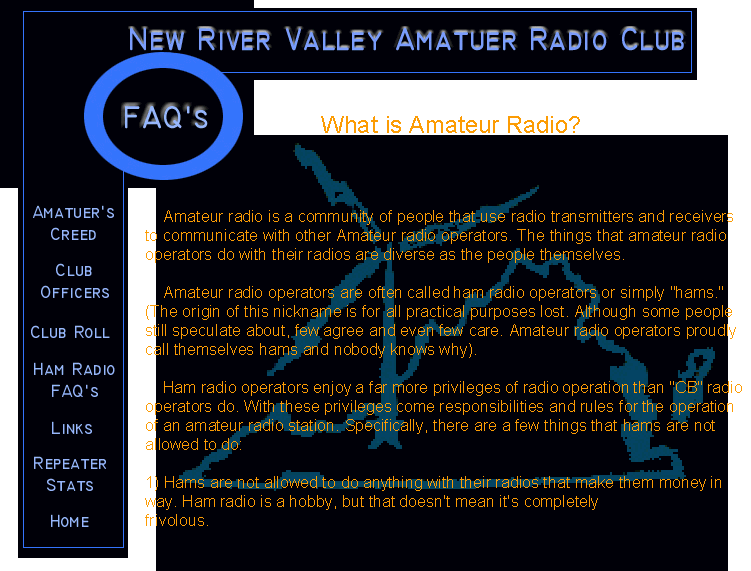
 |
||
| 2) Ham radio operator
cannot `broadcast' to the public. This means that ham radio transmissions
are meant to be received by other ham radio operators. While a short-wave
radios or scanners will allow you to listen to the ham radio bands, what
you will hear is hams talking to other hams and not music or other radio
programs of `general' interest.
Within these (and other) guidelines, however, hams are empowered to do
just about everything that government and private radio stations are allowed
to do.
Things you can
do with Amateur Radio
Talk around the world - With HF radios hams can talk to other hams in literally any part of the globe. Talk around town - With small portable VHF and UHF transceivers hams enjoy extremely reliable communications within their local community. QRP - Communicating with "very low power" is a challenge that many hams enjoy. QRP is usually practiced on the HF bands. Packet radio - The Internet over ham radio? Not really ... but ham radio operators enjoy a digital network of their own, all without wires! International Morse code - Forget it ... You can get a license without knowing one beep or boop of Morse code. Contests - You can put your radio operating skills up against other hams and teams of hams. Order pizzas - It used to be a long standing joke around ham radio operators about what you can not do over ham radio ...
Emergency and other volunteer services - Floods, hurricanes, mudslides,
earthquakes, ice storms ... when ever `normal' communications go out, hams
are ready to use their radios to provide emergency communication services
to their communities. Satellite communications - Hams have their own
How to become
an Amateur Radio Operator
The FCC licenses all hams. Passing a multiple-choice test and paying about
six dollars will get you your licience. The FCC doesn't even give the test
... Hams volunteer to give the test to people that want to become hams.
These volunteer examiners then file the paperwork with the FCC and your
ham
There are many ways to go about preparing for and taking your ham radio license test. Local clubs - For those that like a structured approach, many clubs organize meetings and classes to teach the basic skills of radio operation and prepare people for their ham radio license test. At the end of the classes, a test is given. If you pass, you're a ham!
Many new hams are taught by other hams. (Helping people is a common thread
throughout the ham radio hobby.) A lecturer knows the stuff you need to
pass your test and will help you prepare. While a lecturer can not give
the examination, he or she will be in touch with other hams in your area
and know
Self-study - It doesn't seem right to tell you about going it alone, because then you're not doing it all by yourself! Taking a class is a far better way to get your license; and when you pass your test you will already have friends to talk to. But it's not my job to tell you which method you should use. |